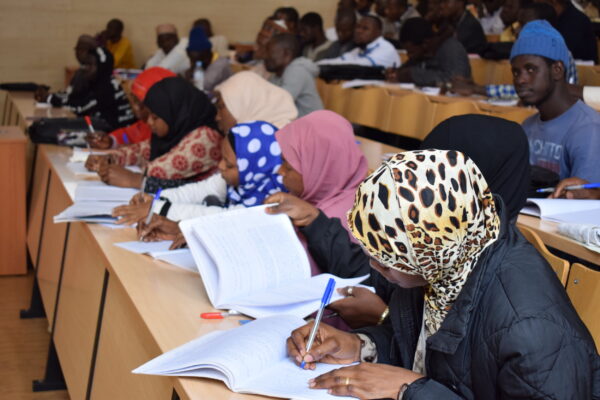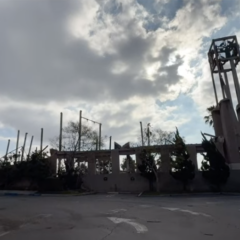This article was originally published in Religion Unplugged, with the support of CRCC’s global project on engaged spirituality. It supplements Priyadarshini Sen’s profile of Ahmed Toufiq.
RABAT, Morocco — Wearing an embroidered loincloth (loincloth is usually worn by males, this is more like a sarong/long wrap skirt) with a matching head scarf, 31-year-old Kulibali Aminata from the Ivory Coast in West Africa says she is determined to champion girls’ education and fight misogyny.
“Landing in Morocco was destiny,” said the Arabic teacher, recounting her journey up the coast from Côte d’Ivoire in West Africa to North Africa. “A friend told me about a training program in Morocco to help women and men become social and religious influencers, so I applied on an impulse.”
Impulse turned into a definitive goal for Aminata when she got selected for the imam training program at the Mohammed VI Institute for the Training of Imams, Morchidines and Morchidates in the capital Rabat, where 1,400 other students are currently training to be religious preachers.
Housed in one of Rabat’s well-heeled neighborhoods with white stucco houses and palm trees, the students at the imam training institute are determined to combat Islamic extremism. King Mohammed VI, descending from Morocco’s more than 400-year-old Alaouite dynasty, inaugurated the school in 2015.
Institutes training imams are common across Africa, but the Rabat-based center stands out because it trains both men and women to become spiritual guides. Since the late-1990s, Morocco has promoted moderate Islam to push back against radicalism at home and as an antidote to the Wahhabi tradition of Saudi Arabia with its links to Salafi jihadism. Morroco’s King Mohammed VI believes women are part of the solution.
“We want to become ambassadors of tolerant Islam and dispel people’s ignorance about religion when we go back home,” Aminata said. “Women can be the change we want to see in this world.”
The modern imam’s mission to combat radicalism
Abdesselam Lazaar, the director of the institute, said imams in the past had a more simplistic role limited to religious rituals, but now they need to bridge the gap between religion and civil society by addressing questions such as democracy, equality, right to education and women’s rights.
“Women scholars are critical for the advancement of learning because they are more intuitive, understanding and empathetic,” said Abdulali Aitzaabou, who teaches Quranic sciences, citations and interpretations at the institute and ideates teaching models to bring Islamic law closer to the students.
The students admitted to the institute train in Islamic jurisprudence and Quranic sciences, Hadith and Sunnah, social sciences, philosophy and vocational studies.
While Moroccans complete the curriculum in one year, the school requires extra time for foreigners to help them “unlearn” the religious training they received as imams in their home countries and to make them stronger opponents of extremist ideologies.
The morchidat program for women leverages the skills of 200-odd female students as propagators of tolerant Islam not only in schools and mosques, but also in public spaces, homes and social settings.
Hajar Aliyat, an ambitious 33-year-old student from Northern Morocco who joined the program last year, believes it’s not easy for women to take the lead in conservative societies even though perceptions are slowly changing.
Aliyat recalls how her extended social and religious community was hostile when she decided to be a religious preacher even though her family gave her full support.
“Some people were saying that higher education for women was a waste of time and that I should stick to a more feminine role, but I wanted to chase my higher calling,” she said.
Even though Aliyat devotes most of her time to traditional Islamic studies in Arabic and French, she also draws inspiration from Sufism and mystical aspects of Islam across Morocco’s rich cultural and religious landscape.
Sufism has influenced Moroccan culture for centuries, and Sufi religious schools called Zawiyas have traditionally advocated a balance between the spiritual, scientific, social and cultural spheres of life. These Zawiyas lie at the heart of the community and address important questions related to human development, mysteries of the self, harmony and awakened consciousness.
Helping imams earn independently
Even though Sufi teachings have played a critical role in Morocco’s understanding of Islam, it was further galvanized as a counter to extremist Islam when King Mohammed VI appointed historian and writer Ahmed Toufiq as Morocco’s Minister for Religious Endowments and Islamic Affairs in 2002, replacing his more conservative predecessor Abdelkebir M’daghri Alaoui.
As a Sufi follower of the Boutchichiya Tariqa that originated in Northwest Morocco in the eighteenth century and advocated a moderate form of asceticism, Toufiq was closely involved in the rehabilitation of Sufi teachings despised by the Salafi orthodoxy with its close ties to Saudi Arabia.
Morocco has long struggled with homegrown Islamic terrorism. In 2003, the Morrocan jihadist militant group Salafia Jihadia, with links to Al-Qaeda, coordinated five blasts across Casablanca that killed 45 people, mostly Moroccans. After the terrorist attack, the king tightened his grip on the country’s religious affairs to promote moderate Islam. The results have been mixed.
In 2017, a group of Moroccan terrorists drove a van into a crowd in Barcelona. Another terrorized the Spanish town of Cambrils, killing 15 people and injuring over 120. In Finland, too, an 18-year-old Moroccon asylum seeker killed two and injured eight in a knife attack. Moroccan networks were also implicated in terrorist attacks in Paris and Brussels.
Toufiq, who is respected for his moderate views and scholarship, has repeatedly appealed Moroccans to practice tolerance and harmony over dogma and fanaticism to fight the extremist threat globally.
“Sufi Islam is all about forgiveness, love and tolerance, and Ahmed Toufiq’s vision is helping us instil these values in our students at the imam training institute,” Quran teacher Aitzaabou said.
Besides Islamic thought, the imam training program focuses on vocational courses such as tailoring, electrician training, agriculture and computer science to help students develop additional skills to make a living when they return to their home countries.
In these vocational training classes, both male and female students sew traditional African clothes, learn how to install and maintain electrical power and control systems and receive computer literacy training.
“The purpose is to help imams become independent,” said Mohammad Abdullah, a student from Nigeria, who believes religious preachers need to boost their skills to make their work financially viable.
Apart from electrical work, Abdullah wants to go back and spread the message of tolerant Islam in Nigeria’s mosques and classrooms to veer the youth away from extremist ideologies like those of Boko Haram and the Islamic State (ISIS).
“Ignorance is the source of ideological brainwashing,” Abdullah said. “The more we spread the message of equality and tolerance, the less people will be drawn to extremism in Africa or anywhere in the world.”
Encouraging religious tolerance
While students see the program as an opportunity to assert their independence, the teachers believe Morocco’s plan to combat extremist ideologies is well integrated within the educational curricula.
“We needed an institution like this because the government should control the field of religion, and lay out the roadmap for students to bridge the divide between secular and religious,” said Abdellatif Elmaimouni, the head of a local council of ulemas in Rabat and Sale who teaches Islamic thought and doctrine.
Elmaimouni believes the government has not only shown “the moderate face of Islam through the teaching model” but has also been non-discriminatory in accepting students from other countries such as Thailand, France and Africa, and across Muslim denominations to strengthen its ideal of religious coexistence.
In one of the institute’s textbooks, Introduction to Christianity, Ahmed Toufiq, writes: “In our day and age, the importance of knowing the other has proved to be vital… and knowledge has become the path to knowing the other and a means by which to acknowledge him.”
The institute’s idea of religious coexistence was further galvanized when Pope Francis visited Morocco last year, sparking hope of interfaith dialogue and greater engagement with the global community. The Pope described Morocco as the “bridge between Africa and Europe.”
“We have introduced students to other Abrahamic religions such as Judaism and Christianity,” said the institute’s director Abdesselam Lazaar. “Through our imam training program we are building a commentary of faithful for all religions without discrimination.”
Some scholars, however, believe despite Morocco’s pitch for tolerant Islam in which King Mohammed VI acts as a buffer against extremist voices, the unquestionable authority of the king prevails.
Osama Abi-Mershed, an associate professor of history and director of the Center for Contemporary Arab Studies at Georgetown University in Washington, D.C. said that while the tradition of Sufism and the king’s lenient approach bodes well for a more tolerant religious discourse, challenging the government is tantamount to challenging the religious authority of the king.
Mershed also believes Morocco does not have an enviable record on human rights and the state behaves like a closed monopoly, which has spurred more conservative voices in society over the last two decades.
While it’s too early to judge the efficacy of the imam training program, the teaching of Moroccan Islam as the “true way” to be a Muslim may be unconsciously forging another rigid worldview. The streamlining of religious education could also be curbing multiple interpretations of Islam that stem from each country’s unique cultural history.
But students at the institute believe the Moroccan king’s efforts are well intentioned and may not only cut back the influence of radical preachers but also change perceptions.
Mouad Boussf, a 32-year-old student from North Morocco who wants to reform prison inmates after his graduation, believes the tolerant Sufi approach will protect people from ideological extremism.
Boussf’s determined Ivorian classmate Kulibali Aminata wants to spread the same message when she goes back home.
“Extremism destroys all that is green,” Aminata said. “The prophet has encouraged women to study, but as spiritual guides we will correct the fanaticism that has crept into religion.”
Click here to read the article on religionunplugged.com.
Priyadarshini Sen is a journalist fellow with the Spiritual Exemplars Project.





